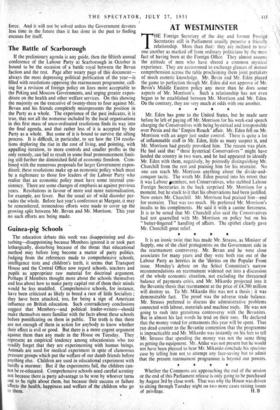Guinea-pig Schools
The education debate this week was disappointing and dis- turbing—disappointing because Members ignored it or took part lethargically, disturbing because of the threat that educational method may before long become a matter of party politics. Judging from the references made to comprehensive schools, intelligence tests and children's teeth, it seems that Transport House and the Central Office now regard schools, teachers and pupils as appropriate raw material for doctrinal argument. Perhaps if Members thought more about the schools themselves and less about how to make party capital out of them their minds would be less muddled. Comprehensive schools, for instance, have been criticised as likely to breed a race of little Socialists ; they have been attacked, too, for being a sign of American influence on British education. Such contradictory conclusions suggest that Members—and political leader-writers—should make themselves more familiar with the facts about these schools before pontificating on them in public. The truth is that there are not enough of them in action for anybody to know whether their effect is evil or good. But there is a more cogent argument against them than any made in the House on Tuesday. They represent an empirical tendency among educationists who too readily forget that they are experimenting with human beings. Animals are used for medical experiment in spite of clamorous pressure groups which put the welfare of our dumb friends before anything else. Children are used in educational experiment with hardly a murmur. But if the experiments fail, the children can- not be re-educated. Comprehensive schools need careful scrutiny not because there is party advantage to be won by whoever turns out to be right about them, but because their success or failure affects the health, happiness and welfare of the children who go to them. -


































 Previous page
Previous page